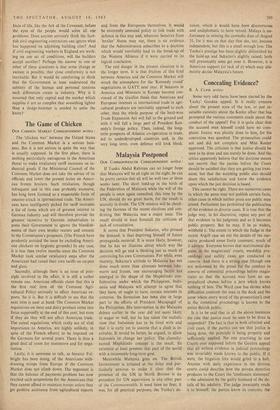The Game of Chicken
OUR COMMON MARKET CORRESPONDENT writes : The 'chicken war' between the United States and the Common Market is a serious busi- ness. But it is not serious in quite the way that is usually supposed. In the first place, there is nothing particularly outrageous in the American threat to make retaliatory tariff increases on in- dustrial goods if the Ministerial Council of the Common Market does not take the advice of its officials and lower the present levies on Ameri- can frozen broilers. Such retaliation, though infrequent and in this case probably excessive, has long been licensed as a respectable form of counter-attack in iqternational trade. The Ameri- cans have intelligently picked for tariff increases a list of items which are of greatest interest to German industry and will therefore provide the greatest incentive to German industrialists to press their Government to ignore the blandish- ments of their own broiler rearers and consent to the Commission's proposals. (The French have prudently avoided the issue by excluding Ameri- can chickens on hygienic grounds.) In any case, it is less than twelve months since the Common Market took similar retaliatory steps after the Americans had raised their own tariffs on carpets and glass.
Secondly, although there is an issue of prin- ciple involved in the affair, it is still a rather remote one. American officials claim that this is the first real item of the Common Agri- cultural Policy seriously to affect American ex- ports. So it is. But it is difficult to see that the next item is near at hand. The Common Market regulations on meat and dairy produce come into force supposedly at the end of this year, but even if they do they will not affect American trade. The cereal regulations, which really are of vital importance to America, are highly unlikely, in spite of the French efforts: to be imposed on the Germans for several years. There is thus a good deal of room for manoeuvre and for nego- tiation. - Lastly, it is nonsense to talk, as Senator Ftil- bright has been doing, of the Americans with- drawing troops from Europe if the Common Market does not climb down. The argument is that the balance of payments problem has now reached such proportions for the Americans that they cannot afford to maintain troops unless they get positive assistance from agricultural exports and from the Europeans themselves. It would be extremely unsound policy to link trade with defence in this way and, whatever Senators from 'broiler' States may say, there is no evidence that the Administration subscribes to a doctrine which would inevitably lead to the break-up of the Western Alliance if it were carried to its logical conclusion.
The real danger in the present situation is in the longer term. It is that friction of this kind between America and the Common Market will wreck the atmosphere for the 'Kennedy round' negotiations in GATT next year. If Senators in America and Ministers in Europe become con- vinced of the Gaullist thesis that American and European interests in international trade in agri- cultural products are inevitably opposed to each other, then the whole purpose of the hard-won Trade Expansion Act will fall to the ground and With it will fall a large part of President Ken- nedy's foreign policy. Then, indeed, the long- term prospects of Atlantic co-operation in trade, aid to underdeveloped countries and, in the very long term, even defence will look bleak.






























 Previous page
Previous page